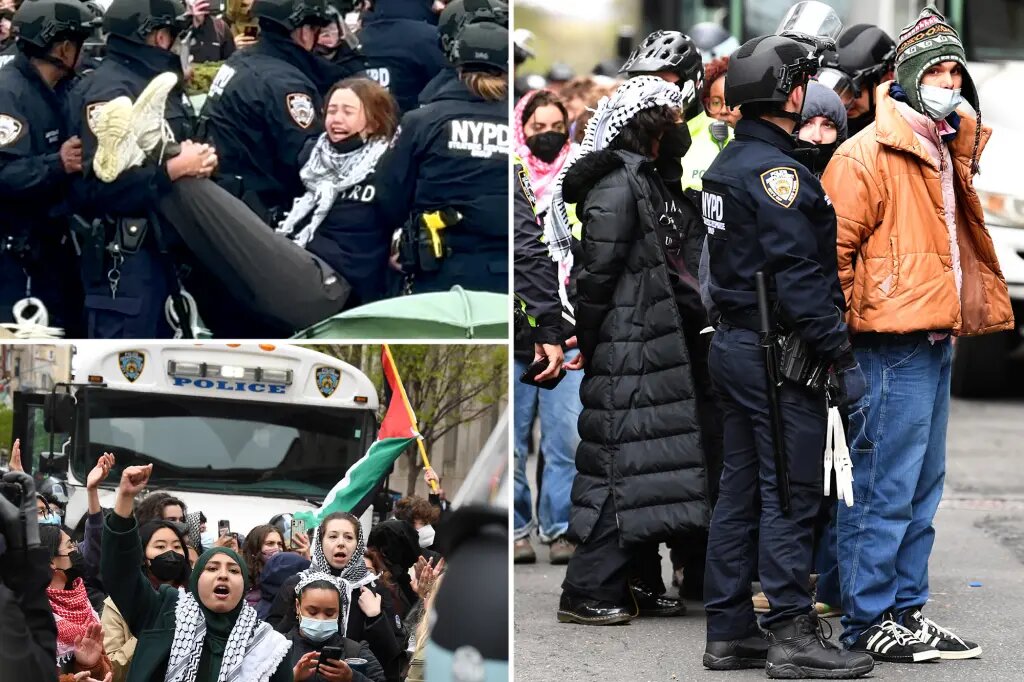US universities silence pro-Palestine activism

TEHRAN- Over the past months, universities in the United States have heavily cracked down on peaceful activism on campus and beyond in opposition to the Israeli genocide in Gaza.
American faculty, students, organizations and lecturers that have been peacefully raising awareness on the plight of the Palestinian people in Gaza have been terminated, expelled or suspended. And it all raises the question of why.
In a country that claims to champion freedom of speech and association, it has become quite clear that this right comes with conditions attached, that would only sit comfortably and/or serve U.S. foreign policy interests.
This is particularly pertinent to foreign policy issues with a high level of sensitivity such as the Gaza genocide, in which the U.S. administration and other policymakers stand accused of complicity.
And so, perhaps not so surprisingly, university groups dedicated to raising awareness on the plight of Gaza throughout the United States, or protesting for human rights, liberation, and self-determination for the Palestinian people, have been prevented from doing so.
Despite the peaceful nature of the pro-Palestinian activism on campus, free speech and association have been met with punishment.
University leaders and state officials have been vague when attempting to justify how these pro-Palestinian students and student groups have broken any campus rules, or how the decision to suspend them or take other punitive measures against them was reached.
The prominent American pro-Palestinian campus group, Students for Justice in Palestine, a network movement founded some 30 years ago, has been suspended from several universities, including Columbia, Brandeis, George Washington and Rutgers. Rutgers is reported to have recently revoked the suspension.
Students for Justice in Palestine joined hands with numerous other organizations in coordinating nationwide student protests including a walkout on college campuses in October and February in protest against Israeli military action in Gaza as well as U.S. support for Tel Aviv.
Organizers with Students for Justice in Palestine say student interest in the 150 chapters that were active at the start of the Israeli genocidal war on Gaza in October had expanded to 80 campuses throughout the country three months later.
While limited in their resources amid a lack of funds or any government backing, this growing voice of dissent, albeit peaceful, appears to have shaken state authorities.
The increasing level of grassroots pro-Palestinian activism has managed to fill the vacuum missing in mainstream media, which hasn’t provided a sufficient platform for a pro-Palestinian voice considering the level of death and destruction in Gaza.
It's in stark contrast to pro-Israeli students who enjoy vast sums from donor networks in addition to various campus Hillels as well as the mainstream media to magnify their pro-establishment position, despite being in the minority.
But punishing the pro-Palestinian voices is also a double-edged sword for hawkish pro-Israeli officials who are trying to silence the student movement’s position on Gaza when at the same time turning their punishment into local, and at times, national headlines.
These headlines raise awareness across the country and can reach out to other students to join their cause.
More than 100 pro-Palestinian protesters were arrested at Columbia University in New York on Thursday after its president authorized police to clear an encampment set up by students demonstrating against the Israeli war on Gaza. The protests were held for a third consecutive day.
Just one civil rights group, Palestine Legal, said it had received more than 450 requests for help for campus-related cases since October 7, 2023, which is a tenfold rise in cases than it received in comparison with the same period the previous year.
According to Palestine Legal, the cases go beyond students who have had their scholarships revoked. They are also dealing with cases that extend to professors being disciplined, and even administrators who have been pressured by uiversity board members, for simply speaking out against genocide.
At the University of Pennsylvania, approval for the screening of a documentary critical of the Israeli military action in Gaza was denied.
At Brandeis University, a pro-Palestinian student group was barred for statements made by its national chapter.
At the University of Vermont, a Palestinian poet was invited to deliver a talk, but the University closed down the meeting.
On Wednesday, the International Youth and Students for Social Equality in the U.S. issued a statement that “condemns the attacks on opponents of the genocide in Gaza among students and faculty that are now underway across the United States.”
“We demand that all faculty, students and organizations that have been terminated, expelled or suspended be immediately reinstated,” the organization underlined.
The statement highlighted that “over the past month, universities across the U.S. have arrested, expelled and suspended students for participating in pro-Palestine demonstrations. Faculty have been terminated or placed on leave”.
“In Texas, Governor Greg Abbott has issued an executive order demanding that the state university system ‘establish appropriate punishments, including expulsion from the institution’ for students who oppose the genocide.”
The very lengthy statement indicates the crackdown on pro-Palestinian activism in the U.S. is widening, but it will not succeed in achieving its goals. At one point, even referring to it as a “psychological war”, it maintains that the idea of silencing an anti-war protest movement in the U.S. “will inevitably collapse”.
Many analysts have praised the younger American generation and university students for standing up to the bullying tactics of U.S. officials, despite the punitive measures they face.
Leave a Comment